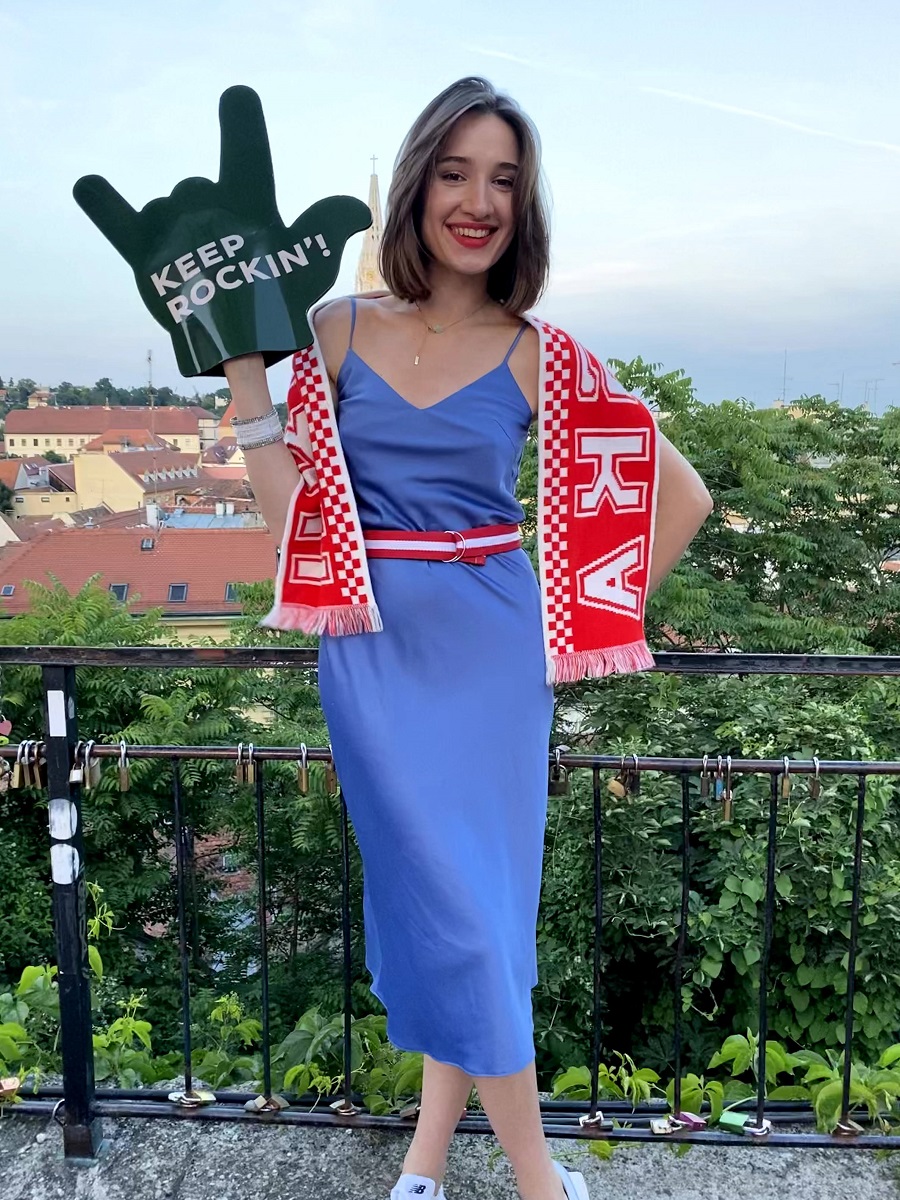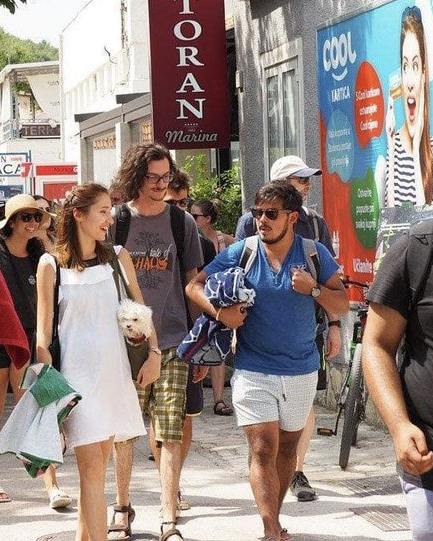April 24, 2022 - Among the growing number of foreigners relocating to Croatia, international students are increasingly visible. So who are these foreign students choosing Croatia, and why? In the third of a new series, we get the perspectives of life and study in Croatia through the eyes of its foreign students, continuing with Elizabeth Borysiuk from Ukraine.
Among the many foreign tongues heard around the Croatian capital these days is the growing number of students choosing to do their graduate programmes in Croatia. A safe, affordable EU country, with a rapidly expanding programme of high-quality graduate courses in English, with excellent employment opportunities upon graduation, are just some of the reasons for choosing Croatia. And the quality of that education was highlighted recently, as Algebra University College signed an academic partnership agreement with Goldsmiths, University of London (as reported previously on TCN), thereby allowing Algebra students to study under the approved programmes of one of the 500 best universities in the world according to the World University Ranking.
Despite the growing excellence of English-language graduate and post-graduate education in Croatia, the opportunities are not so well known, and so TCN - in partnership with Algebra University College - has compiled an authoritative guide to what you need to know about studying in this beautiful country. Check out the Total Croatia Study in Croatia guide.
Nothing paints the real picture of studying in a foreign country better than the real experiences of students living the day-to-day reality. In a new series on TCN, we meet some of the international students who have fallen in love with Croatia, many of whom plan to stay and work here if they can find employment. We look at the realities of life, why they chose Croatia, and what advice they have for others contemplating studying in Croatia.
Next up, Elizabeth Borysiuk from Ukraine, a graduate student in Creative Market Communications Management at Algebra University College.

1. You chose to study in Croatia. Tell us what were the main factors in that decision.
When I was choosing a direction for my master’s degree the 2 winning points for Croatia were: location and international programs. This country is well-known among students in the western world and not only for great parties and beautiful views. I was impressed by the range of international connections and experiences that local universities are offering. It works both ways and the diversity is growing every new year. I thought it would be a great opportunity to study the same subjects from different perspectives, creating a diverse network while having a chance to discover the most beautiful country in the Balkan region.
2. How is the experience so far? Give us some pros and cons.
Right now being at the stage of graduation I must admit that the third winning point about studying in Croatia is the educational system and how strong it is. This is not a secret that many Croatian students are getting jobs in the most prestigious fields around Europe, and the key to success is laying in the school base. For incoming students it is both pros and cons because even these days we hardly can handle the Croatian style of both leisure time and study, so we are always struggling to choose the one (laughing). Being a student of design and communications management in Algebra University College, I am studying among colleagues who are leading complex projects in design agencies and our professors are CEO or creative directors with a full range of real-life award-winning cases. This is not what I expected coming here, but can’t be happier about such an open-minded approach.
From the biggest challenge these days I can highlight the application process for a residence permit. Even though it is well-known that bureaucracy and governmental establishments are still meant to be improved, sometimes it can become very complicated due to miscommunications and waiting time, so students are getting into inconvenient situations. The most interesting is that there is no one specific reason, everyone has their trouble case.

3. How was your perception of studying in Croatia different from reality? Give us some things that have surprised you about the experience?
I had mixed feelings about Croatia both from a master student and traveller perspective. Knowing that the central attention is drawn to coastal tourism, as well as being educated about the history and the globalization influence on local youth, I expected to learn the basics, travel to see some islands and move forward to another country. But already after my first visit, I felt like this is my new home and I want to stay. Hardly anyone can resist seeing the most beautiful coast in Europe, but I was touched by local people and the culture itself. I got deeply connected with the values and the charm of the Croatian style of living. As in any other country, there are surely some flaws, but it has nothing to compare with seeing how people can cherish the most important things: life, nature, freedom.
4. How easy was it to do the paperwork to enrol in the study program? Any suggestions to improve things?
In my university, it was a very organized comfortable process. Coming through a strict selection, both professor and I understood the responsibility and the level of educational background required, but after we settled down all agreements at the interview, the collection of documents and help with legal papers work has been fully provided by the international office. However such documents as Recognition of foreign education qualifications in Croatia and the process of receiving it can be still confusing for the incoming students as well as the process of getting a transport card, that can be issued only if you pay a visit in private ( on those rare working days and hours) to the transport office where workers rarely speak English.

5. Tell us a little about the accommodation and the cost of living.
It is definitely not the cheapest country in Europe. Even though Croatia has its own currency, I must admit - prices are quite high compared with other south-eastern countries. The most expensive turns to be groceries and market food. Costs are like in Austria, however, the quality of products is much higher, I must admit. After that comes spending on car gas and service, but this is an essential in Croatia if you need to travel.
One point that I like: here rarely happens any problems to finding accommodation within your budget. Such cities like Zagreb, Rijeka and Split have all facilities for students, starting from dormitories to big apartments for 5-8 persons. In Zagreb people are quite open when it comes to offering accommodation to foreigners, most of the apartments in the central area are well-equipped and restored, and you can rarely find fraud cases. However, it is important to double-check the bills for maintenance and utilities and discuss with the owner the price, since it can definitely hit your budget, especially during wintertime. What is really useful is a big community in social media groups for students, that helps with the first steps of relocation.
6. Finding work is a key priority for students, both to help finance the study, but also upon graduation. How hard have you found it to find work, and what are the main obstacles?
This is a part of a conversation that is definitely waiting for improvements. For foreign students who don’t know the language - it is a double challenge. Firstly, because a foreigner can’t apply for a full-time job while studying when a Croatian student can. It is meant to be changed at the nearest time, but so far the only legal option is a part-time job or an internship. Secondly - the language itself. Most of the companies and agencies are working locally, meaning using the Croatian language within the process of work. It can be hard for a student to get adapted to such an environment, however, there is much more luck in the IT industry. Zagreb and Rijeka are hosting departments of big enterprises, who are looking for people with 2+ European languages, so it is a question of time and luck. In the case of the design and marketing field, most of the time they prefer to hire experienced Croatians, or those that have been referred by connections ( which is a common thing in Croatia). Though the most confusing point for me is how low the salary rate, and how some fields are being highly underpaid.

7. Tell us about the Croatian lifestyle and making friends. How has it been for you?
This is one of the most valuable parts of my life in Croatia - the people and community I belong to. Coming from Ukraine, this country is the 4th place that I have lived and I never felt more accepted anywhere before. What to say, if I managed to start speaking in Croatian only after 4 months of being here and felt confident enough to use it daily already in 9 months. Of course, there have been different situations, because Croatian people still have a lot of character on a side with "polako" living, but it only helped me to become more stable and stronger with identity. For the last 3 years, I have met my best friends and soul companions from Zagreb, Rijeka, Cres, Mali Losinj, Canada, France, Israel, Germany and many more. The amount of fun events throughout the year is overwhelming. There were no problems with making connections, since if anyone has been discovered with a bad mood - Croatian people can quickly shift the vibes. Locals don’t like it when someone is behaving weirdly or gloomy, that’s important to know.
8. Do you plan to (try and) stay in Croatia when your studies finish? Why/not?
It will certainly depend on job offers and income rate in my field since currently, this is the most important factor. But speaking long-term - yes, I would love to stay and call this place my home, while contributing to the development of the country. I and my twin sister were planning to open an art cafe to attract the creative youth of Zagreb and let them collaborate. Coming from a rich background of coffee&breakfast cult in Kyiv, we want to bring it up here, while giving enough space for designers and artists to present their works. We believe that the Croatian service market still has where to grow, what to discover and offer and it is a great segment to invest into.

9. Three things you have enjoyed most about your experience studying in Croatia?
For the first point, I won’t be very original saying travel and nature. It is the richest country in my experience when it comes to climate and sightseeing. The second one would be my professional network and the diversity of people I met during my study, locals and foreigners - priceless knowledge and connections. And third is a local lifestyle. I adore watching after people on the street, how they drink coffee, taste wine, talk loudly, laugh and enjoy the moment. Locals blame this for being jobless and lazy, but I see it as the highest level of hedonism, exactly where genuine happiness of life is laying.
10. What advice do you have for people who are considering studying in Croatia?
I would say that there is no heaven on Earth and don’t expect that your everyday life will look like your last summer trip to Split. However if you are ready to stay humble, open, learn how to take things easy and slow - this is the country for you. Croatia is full of surprises, and I am not even speaking about the islands and the sea. Be ready to get things done your way while being innovative and daring to study a lot. And finally, be ready to have sleepless nights and long midday coffees - it is an essential here.
Are you an international student on a graduate or post-graduate course in Croatia, who would like to be featured in this series? Contact us on This email address is being protected from spambots. You need JavaScript enabled to view it. Subject Study.
To learn more about the options for studying in Croatia, check out the Total Croatia Study in Croatia guide.
For more information on courses offered by Algebra University College, visit the official website.


